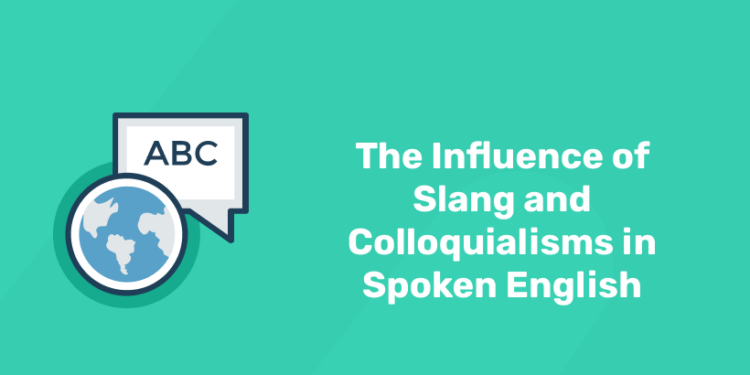Table of Contents
Slang and colloquialisms play a dynamic role in shaping spoken English, reflecting cultural shifts, social identity, and generational trends. These informal linguistic expressions often bridge gaps between formal language and personal communication, enabling individuals to convey familiarity and authenticity. Their pervasive presence in conversations demonstrates how language evolves organically, adapting to contemporary contexts and influencing communication styles. Studying these linguistic phenomena offers insights into societal changes and linguistic creativity within the realm of spoken English. In this article, we shall discuss the influence of slang and colloquialisms on spoken English.
The Influence of Slang and Colloquialisms in Spoken English
What is Slang?
Slang refers to a subset of informal language that consists of unconventional words, phrases, and expressions often used within specific social groups or communities. It is characterized by its deviation from standard or formal language, and it often incorporates creative, playful, or even subversive elements. Slang terms can be short-lived or become part of everyday vocabulary, reflecting shifts in culture, technology, and social dynamics. Slang is a way for individuals to establish group identity, display camaraderie, and sometimes even challenge established norms. It can vary widely across different regions, age groups, and subcultures, making it a dynamic and ever-evolving aspect of language.
How does Slang Influence Spoken English?
Slang exerts a significant influence on the English language in several ways:
Positive Influences of Slang on English:
Cultural Richness:
Slang contributes to the vibrancy and diversity of the English language by incorporating words and expressions from various cultural, social, and subcultural contexts.
Expressiveness:
Slang allows speakers to convey emotions, attitudes, and nuances that might not be easily expressed using formal language. This enhances communication and adds depth to conversations.
Creativity and Innovation:
Slang is often a playground for linguistic creativity, leading to the invention of new words, phrases, and idioms. This constant innovation keeps the language dynamic and adaptable.
Social Bonding:
The use of shared slang fosters a sense of belonging and camaraderie among individuals belonging to the same group or community, enhancing social cohesion.
Youth Culture and Identity:
Slang is frequently associated with youth culture and helps young people establish their unique identities and differentiate themselves from older generations.
Negative Influences of Slang on English:
Miscommunication:
The use of slang can lead to miscommunication, particularly when speakers from different backgrounds or generations are involved. Not everyone may understand the intended meaning of slang terms.
Erosion of Formal Language Skills:
Over-reliance on slang might lead to a decline in formal language skills, potentially affecting written communication, academic performance, and professional interactions.
Exclusion and Stereotyping:
Exclusive slang used by specific groups can create barriers between different communities, fostering stereotypes and reinforcing social divisions.
Language Deterioration:
In extreme cases, excessive reliance on slang might lead to a degradation of language standards, eroding grammar rules and proper language usage.
Cultural Appropriation:
The adoption of slang from marginalized or minority communities by dominant groups can lead to cultural appropriation and misrepresentation.
Inaccurate Portrayal:
Slang can perpetuate inaccurate portrayals of certain communities, cultures, or lifestyles, contributing to misunderstandings and reinforcing biases.
Lack of Professionalism:
In formal or professional settings, excessive use of slang may be perceived as unprofessional or inappropriate, potentially affecting career opportunities.
In summary, slang has both positive and negative influences on the English language. While it adds color, creativity, and a sense of identity, it can also lead to misunderstandings, exclusion, and a potential decline in language standards if not used judiciously. Balancing the use of slang with a strong foundation in formal language skills is important for effective communication and linguistic proficiency.
Speak confidently and fluently with our Spoken English Course! Get Free Demo Here!
What is Colloquialism?
Colloquialisms are informal and everyday expressions, phrases, or words that are commonly used in spoken language and informal writing. They are often specific to a particular region, community, or social group, and they may not adhere to strict grammatical or linguistic conventions. Colloquialisms add a casual and familiar tone to conversations and texts, making them relatable and accessible to a wide range of people.
Colloquialisms can include slang terms, idiomatic expressions, regional dialects, and vernacular speech. They are often used to convey a sense of intimacy, authenticity, and cultural identity. However, because colloquialisms deviate from formal language norms, they may not be suitable for all situations, such as formal writing or professional communication.
Examples of colloquialisms include:
- “gonna” (instead of “going to”)
- “wanna” (instead of “want to”)
- “y’all” (a contraction of “you all,” often used in Southern American English)
- “ain’t” (a non-standard contraction of “am not,” “is not,” “are not,” “has not,” or “have not”)
- “buck” (meaning a dollar in American English)
- “chillin'” (meaning relaxing or taking it easy)
In essence, colloquialisms contribute to the rich tapestry of language by reflecting the informal and dynamic nature of spoken communication.
spoken english made easy by aparna mulberry !
How does Colloquialisms Influence Spoken English?
Positive Influences of Colloquialisms on English:
Authenticity and Relatability:
Colloquialisms bring a sense of authenticity and relatability to language, making conversations and texts feel more natural and engaging.
Cultural Expression:
Colloquialisms often reflect the cultural diversity and nuances of different regions and communities, preserving and celebrating local identities.
Expressiveness:
Colloquialisms allow speakers to convey emotions, attitudes, and nuances that might be challenging to express using formal language.
Familiarity:
Colloquialisms create a sense of familiarity and camaraderie among speakers, enhancing social interactions and group cohesion.
Creative Language Use: Colloquialisms encourage creativity and playfulness with language, fostering linguistic innovation and wordplay.
Join our Spoken English program today and communicate with ease!
Negative Influences of Colloquialisms on English:
Miscommunication:
The use of colloquialisms, especially in cross-cultural or formal contexts, can lead to misinterpretation and misunderstanding.
Language Erosion:
Overreliance on colloquialisms might contribute to a decline in formal language skills, affecting writing, education, and professional communication.
Exclusion and Stereotyping:
Colloquialisms that are specific to certain communities may exclude individuals who are not familiar with those terms, leading to social divisions and stereotypes.
Lack of Precision:
In situations where precise and clear communication is necessary, colloquialisms may lack the precision and clarity of standard language.
Professionalism:
Using colloquialisms in formal or professional settings could be seen as unprofessional, potentially impacting one’s credibility and opportunities.
Language Standardization:
Excessive use of colloquialisms might contribute to the erosion of language standards and grammatical rules.
Global Communication:
In an increasingly interconnected world, heavy use of colloquialisms may hinder effective communication with non-native speakers or individuals from different linguistic backgrounds.
In summary, colloquialisms bring vitality and cultural richness to the English language, but they also pose challenges in terms of clarity, inclusivity, and appropriate usage. A balanced approach that respects context, audience, and the conventions of formal language can help harness the positive aspects of colloquialisms while mitigating potential negative influences.
Conclusion
The Influence of Slang and Colloquialisms in Spoken English was discussed. In the tapestry of spoken English, slang and colloquialisms serve as vibrant threads connecting language with culture, identity, and expression. Their dynamic presence enriches conversations, adding authenticity, relatability, and creativity. While fostering a sense of belonging and reflecting societal shifts, they also demand caution in maintaining clear communication across diverse contexts. Understanding the dual nature of their impact allows us to appreciate their role in shaping spoken English while embracing the responsibility of preserving clarity and inclusivity in our linguistic interactions.
learn spoken language in your native language !
1: Which of the sentences below is grammatically correct?
Spoken English Course for Guaranteed Confidence and Career Growth
Spoken English Course by Entri App: Enhance your communication skills, gain certification, and boost your career with confidence.
Join Now!The Influence of Slang and Colloquialisms in Spoken English: FAQs?
1. What is the difference between slang and colloquialisms?
Ans. Slang refers to informal and unconventional language used within specific groups, while colloquialisms are informal expressions that are commonly used in everyday conversation. While both deviate from formal language, slang is often more specific to certain subcultures, and colloquialisms are more widely understood.
2. How does slang contribute to cultural identity?
Ans. Slang reflects the values, experiences, and unique identities of different cultural groups. Its use helps individuals establish a sense of belonging and solidarity within their communities.
3. Do slang and colloquialisms have a role in professional communication?
Ans. While some degree of informality can humanize professional communication, excessive use of slang or colloquialisms might be perceived as unprofessional in formal settings. Context and audience awareness are crucial.
4. Are slang and colloquialisms the same across different English-speaking regions?
Ans. No, they often vary significantly based on geography, age groups, and social contexts. Different regions and communities develop their own unique slang and colloquial expressions.
5. Do slang terms eventually become part of standard English?
Ans. Yes, some slang terms gradually become widely accepted and integrated into standard English over time. This process reflects the evolving nature of language.
6. How can one balance the use of slang and formal language?
Ans. It’s important to adapt language based on the context and audience. While slang adds informality and authenticity to conversations, understanding when to switch to formal language is crucial, especially in professional or unfamiliar settings.
7. Can slang perpetuate stereotypes or offensive language?
Ans. Yes, some slang terms may reinforce negative stereotypes or offensive language. It’s important to be aware of the potential harm and choose language that promotes inclusivity and respect.
8. Is the use of slang more prevalent in certain age groups?
Ans. Slang is often associated with youth culture, as younger generations tend to create and adopt new linguistic trends. However, people of all ages can use slang to varying degrees.
9. How can I keep up with evolving slang and colloquialisms?
Ans. Staying engaged with popular culture, social media, and interacting with diverse groups can help you stay informed about new slang and colloquial expressions.
10. What role does slang play in language evolution?
Ans. Slang drives linguistic innovation, introducing new words, expressions, and grammatical structures. It reflects societal changes and adapts to emerging technologies and trends.
Speak confidently and fluently with our Spoken English Course! Get Free Demo Classes!











